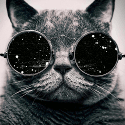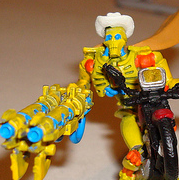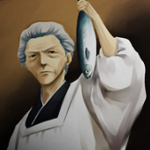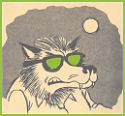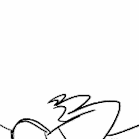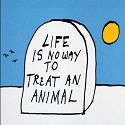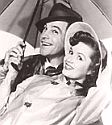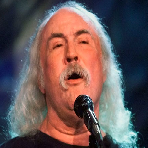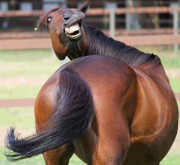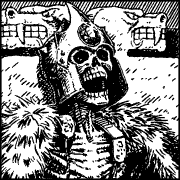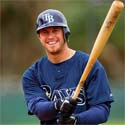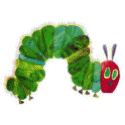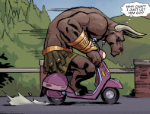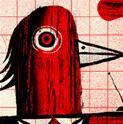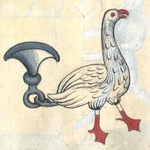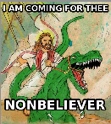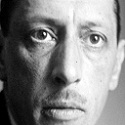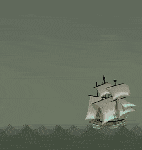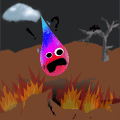|
January update! 1. Looking for Alaska by John Green: Started out kind of meh, but picked up as it progressed. Some of the characters seemed a bit one-dimensional. I didn't see the main plot event coming, though in retrospect it was kind of obvious. An enjoyable read, anyway. 2. Otherbound by Corinne Duyvis: I was excited about this one because the general premise seemed interesting (everytime the protagonist closes his eyes he sees through the eyes of a girl in another world). However, I was a little disappointed. The "other" world had some nice details, but ultimately felt underwhelming. I wish the author would have done more with it. 3. Little Women by Louisa May Alcott: I liked it… I think. Not a lot happened, and some parts were kind of slow and boring, but overall it was engaging enough. I appreciated the author not going for the obvious "solution" though in reference to Jo and who she ended up with. 4. The Girl With All The Gifts by M. R. Carey: I'll spoiler this just in case anyone wants to read it – it's more fun going into it with less info. So, zombies. I liked it a lot up until the middle bit where they're out in the open trying to survive. That part felt a lot less original, as it's more of a classic zombie thing. They smell you, they outrun you, you have to find shelter, deal with limited resources, etc. Felt familiar to a lot of other works. The ending, however, left me feeling weirdly uneasy, as it was not as clichéd as I had feared it would be. Overall, it was good! 5. The Maze Runner by James Dashner: This just wasn't great. The protagonist was bland as hell and didn't earn any of the ~special~ attributes that were just put on him for no reason whatsoever, the one girl who of course was both beautiful and magical had absolutely no function and virtually none of the plot made any logical sense. Despite all this I kept reading on though, so there's that. Goal: 5/45 Currently reading Murder on the Orient Express by Agatha Christie. I actually don't know the story at all, and I've no idea who the murderer is. Seems good so far!
|
|
|
|

|
| # ? Apr 25, 2024 17:08 |
|
January Update. This year I'm going to do a month off/month on with the genre trash I like to read, starting (mostly) with a month off. The booklord has presented a challenge and who would I be to not participate.
1. The Scarlet Letter by Nathaniel Hawthorne (yes, it is a low effort entry for "The color red".) The book is littered with verbose descriptions of everything the author can possibly describe, broken up only by the most heavy-handed symbolism he could conjure. 2-3. The Fellowship of the Ring & The Two Towers by JRR Tolkien (We were doing a big "Tolkien-Fest" on the podcast I host to celebrate the last of the Peter Jackson Middle-Earth movies, so I read what I could before the episodes.) The biggest thing about the fellowship that surprised me was the way the story is set up it lacks almost any sense of urgency. The descriptions of decades of living in the shire, the detailed descriptions of day after day of wilderness travel, the story slamming to a halt at Tom Bombadil's house, and the fact that when they stop anywhere they stay for an entire season. While all of it does add to the scope of the tale, it kills any momentum the story could build up. 4. Moby Dick by Herman Melville I honestly thought the whole "Whale encyclopedia" thing was just a commentary on the dry nature of the book. Turns out half of the book is an encyclopedia on whales and whaling. It reads like someone's first year NaNoWriMo story, with huge sections of padding that completely destroy the flow of the narrative. Speaking of the narrative, the beginning was really enjoyable, Melville does a great job making you feel the Nantucket winter while he waits for his ship to come in, and the last third of the story part of the book is exciting and does a great job depicting Ahab's madness, but I feel the middle third drags considerably. Would I recommend it? Yes, but I'd recommend finding an abridged that omits the encyclopedia. 5. Gilgamesh: A Verse Narrative I liked it. I think the version I read was originally published in the 1930's, so I might have to search for a more up to date translation at some point. 6. The Autobiography and Other Writings by Benjamin Franklin A fascinating read. The autobiography benefits tremendously from being written as a letter to his son, as the conversational tone makes it easy to read and gives you a sense of Ben Franklin as a person. The back half of the book is selected writings of Franklin's on a variety of topics from family life to science to diplomacy. I'd heartily recommend this. 7. Paradise Lost by John Milton For the most part I enjoyed it, though I would have to say that Michael becoming the Archangel of Spoilers in the last two books went on a little too long. The edition I read included Gustave Dore's engravings, which were all fantastic. Overall I feel like I was a good effort for the first month.
|
|
|
|
Because it's been a while, or: another book update. #5: The Book of Jhereg - Steven Brust: Omnibus edition of the first three books in the Vlad Taltos universe. I thought the first two books were good, but the third one is definitely a weak point in the series. Other people have expressed similar opinions, with which I can't say I disagree. Still interested in reading the other Vlad Taltos books (including the Khaavren books). 4/5 overall (3 for Teckla). #6: Hi-De-Ho: The Life of Cab Calloway - Alyn Shipton: A decent overview of the man's life, if rather dry in the middle with all the intricate descriptions of band members and recordings and other paraphernalia. 4/5. #7: The Emperor of All Maladies - Siddhartha Mukherjee: A history of cancer and medical breakthroughs in curatives and palliatives. A bit dry stylistically and it was more interesting when talking about cancer patients, but it was well-researched and I definitely learned more about cancer. 4/5. #8: Rapture Ready! Adventures in the Parallel Universe of Christian Pop Culture - Daniel Radosh: A discussion of exactly what it says on the cover. Very much in the AJ Jacobs / Nathan Rabin mold of writing. It was published in 2008, so it's already a little bit dated (especially regarding last year's relative deluge of mainstream Christian movies), but it was mostly interesting. 4/5. Currently reading: The Count of Monte Cristo and the second book in John Julius Norwich's 3-book history of Byzantium series.
|
|
|
|
January! 1) The Best American Travel Writing 2014 Edited by Paul Theroux: This edition was kind of a throw back to those adventure travel stories of the yesteryear. Some of the stories where interesting, while others where flat. 3.78/5 2) The Best American Short Stories 2014 Edited by Jennifer Egan: Unlike most of these collections, this as the first on that I felt had a recurring theme. Egan found a bunch of stories that had the concept finding a home after something bad happen. Like the Travel Writing collection, some of the stories were good, while others fell flat. 3.87/5 3) Special Deluxe: A Memoir of Life and Cars by Neil Young: Neil Young loves three things: Music, Dogs, and Cars. This book cover the cars aspect. Everything that he's ever driven, from Mort the hearse that inspired Long May You Run, to the Lincvolt, Neil Young's crazy experiment in making a electric car. It was an interesting read if your a car guy or just a fan of Neil in general. 4.75/5 Currently Reading: Live From New York: The Uncensored History of Saturday Night Live With the 40th anniversary special coming up in a couple of weeks, I figured that I would read this one. I thought that it was going to be a fast read, but I was wrong. This one will be read till the middle of next week.
|
|
|
|
Previously on poo poo I've read: 1. The Spy Who Came in From the Cold - John le Carre 2. The Gunslinger - Stephen King 3. The Drawing of the Three - Stephen King 4. Maphead by Ken Jennings 5. Stiff: The Curious Lives of Corpes - Mary Roach Update 2, second half of January. 6. Packing For Mars - Mary Roach I've read a poo poo load of books about space so I was skeptical as to how much I would get out of this. Luckily for the most part the stuff she focused on steers clear of the really obvious stuff that has been written about space travel, and as a result it was an interesting look at the logistical problem of sending bags of sentient meat into space for long periods of time. Not anywhere near the best book about space travel I've ever read, but not a bad one either. I don't regret reading it. 7. Skunk Works - Ben Rich & Leo Janus This book was awesome. The old Skunk Works is a bit of local pride for me, since I grew up in Burbank and drove by it a billion times as a kid. This book is a fantastic look at one of the most interesting and uniquely operated industrial outfits in military history. It's also a pretty timely read at the moment, considering the F-35 debacle it's interesting to read about a time when Lockheed wasn't total poo poo. I'm not gonna lie I nearly cried at a few parts of this book, mainly the description of the end of Kelly Johnson's life, and the author's own epitaph. I'm a dork. 8. Gardens of the Moon - Steven Erikson A fantastic fantasy book and I'm excited for the rest of the series. It wasn't as confusing for me as people warned, and it's just the type of poo poo I've been looking for in a fantasy series for a long time. It takes a lot of brain power to read, though. I'm trying to work up the courage to dive into Book 2 right now. 9. Reaper Man - Terry Pratchett This was a really weird Discworld, not my favorite so far but not bad either. The Death part of the story was poignant and quite nearly brought me to tears out of nowhere in the last 20 pages or so. It's a bit of an unfocused mess though thanks to the other plot lines in the book. 9/40 4/8 Non fiction 2/4 Books by Women 1/4 Non sci-fi fantasy fiction 9 freaking books in one month. I wasn't expecting that. I may have been a little too conservative in my estimate because I've never really counted how many books I've read in a year before. I'm very likely going to need to nearly double my goal (and some subgoals) in a few months if I keep up this pace. I did I a lot of quick non-fiction books this month which sped things up, however. Plus, reading Malazan though should slow me down pretty quick as well. We'll see how many I can crank out in February. Damo fucked around with this message at 00:16 on Jan 30, 2015 |
|
|
|
Christ, it's only the end of January and I'm already 2 books behind!
|
|
|
|
January tally: 1. Menneskefluene by Hans Olav Lahlum. 2010 debut crime novel by a fairly well-known Norwegian media personality (really a historian but a general power nerd), but it's a period piece set in 1968 and dealing with one-generation-later fallout from WW2. Very much a classic mystery with a great locked-room murder, memorable characters, dramatic reading of the murder victim's last will and testament, etc. Enjoyable and clever, liked it a lot. 2. Teckla by Steven Brust. #3 in the Vlad Taltos series, and a decades-later reread for me. I love this series so much. 3. Ultima by Stephen Baxter. Pretty much Baxter doing what he does: Exploration of weird-rear end physics and cosmology, with paper-thin characters and so on. Decent but not really top-shelf Baxter. 4. Satellittmenneskene by Hans Olav Lahlum. #2 in the series that started with #1 above. Apparently there's six of these books already. Good read again, very much in the Agatha Christie vein. The main characters here are a quite competent police detective and a teenage girl in a wheelchair (who shows up as an unofficial consultant; daughter of a friend of the detective's family; extremely intelligent but also a bit of an rear end in a top hat). Still reading Worm inbetween other stuff. So far: 4/40 overall goal, of which 1/5 allowed rereads 2/10 Norwegian books Booklord challenge points met: 12 (Ultima), 13 (Teckla; teleporting sorceror-assassins aren't particularly real), 15 (Ultima again, published November 2014), 22 (Menneskefluene). Groke fucked around with this message at 11:15 on Jan 30, 2015 |
|
|
|
CestMoi posted:Don't u usually read all those sorts of books anyway? Doesn't seem like much of a challenge IMO......... I crave structure. 1 One Third of a Nation by Arthur Arent and others. A play exploring the dire housing situation in depression-era New York. Agit-prop long past its sell by date but still fascinating, mostly for being in such a foreign style. (17) 2 Agapé Agape by William Gaddis. Picked this up again and it's a really interesting read. Managed to get a few references that I missed last time, like I somehow didn't clock that he was talking about Nietzche, somehow. Still need to read it with a Steven Moore guide to get them all though. 3 Agapé Agape by William Gaddis. I had a long journey and it's 100 pages. Read through this time paying attention to the main character, how he's buffetted by bouts of intense pain and delerium. 4 The House of the Solitary Maggot by James Purdy. Another re-read, the bits in the cinema are as good as I remember them, but I was sure there was a crucifixion in this. Maybe it's in another one of his. It's written in a weirdly conversational style where characters and locations are introduced and then introduce their history with the family which we surely would have heard of before. It's a shoe-in for challenge eleven as every single one of the 5 characters both loves and hates each other. (11) 4/60 Anyone want to suggest a wildcard for me?
|
|
|
|
It doesn't look like I'll be finishing anything else this month, so here's my list so far: 1) The Other Boleyn Girl - Philippa Gregory: Not the best Tudor-related fiction I've ever read. She really leans way on the 'fiction' side of historical fiction, and has a tendency to put modern day codes of morality on medieval society. Still, I hate to leave a series unfinished so I'll probably read the rest of these. 2) Akira Vol. 3 - Katsuhiro Otomo: Manga is not really my thing but I read the first two volumes in this series and want to see how it ends. Not bad overall. 3) Steel Magnolias - Robert Harling: I love the movie and loved the play as well. I didn't even know it was a play until I found it searching for a play for Stravinsky's Challenge. It's pretty close to the movie except that all the scenes take place in Truvy's salon, and there are no male speaking roles. I also didn't know that it is based on a true story; the author's sister died of complications from diabetes. Fun fact: the nurse that turns off Julia Robert's life support in the movie is the real life nurse that turned off his sister's life support. 4) The Four Feathers - A.E.W. Mason: While there wasn't as much action in this book as I initially thought, it was a fascinating look at the role of 'honor' and how important it was in imperial Britain. 5) Giant's Bread - Mary Westmacott (AKA Agatha Christie): One of her few non-mystery novels. There were a couple of twists at the end which I never saw coming. Quite good. 6) A Good Marriage - Stephen King: A novella in which a wife discovers a horrifying secret about her husband while he is away on business. It's a good premise and the book is short enough that King doesn't have room to ruin it with his weird word games and interminable internal monologues. We do get the life history of every character and how a childhood event reverberates through their entire life though. 7) Eiger Dreams: Ventures Among Men and Mountains - Jon Krakauer: A collection of some of Krakauers essays for various magazines over the years. Not bad. 8) In the Heart of the Sea: the Tragedy of the Whaleship Essex - Nathaniel Philbrick: The true story of the whale that sunk a whaleboat and what happened to the crew afterwards. It also has a nice little history of whaling in Nantucket. This is the event that inspired Melville to write Moby Dick. Very good. 9) Foundation - Isaac Asimov: I wanted to like this more, but it was hard to keep track of who was who as all the characters were completely interchangeable. It's a nifty premise but it was hard to remain interested in the characters who ranged from bland to annoying. 10) The Best of Edward Abbey - Edward Abbey: a collection of his essays and selected book chapters compiled by the author himself. I love Ed Abbey. 11) A Spy Among Friends: Kim Philby and the Great Betrayal - Robert Macintyre: The true story of a double agent in MI6 who went undetected for decades and basically undermined all western intelligence for years, passing untold numbers of secrets to the Soviets. I found this fascinating. Total: 11/100 Presidential bios: 0/12 Non Fiction barring prez bios: 4/25 Stravinsky's Challenge: 1. The vanilla read a set number of books in a year. 11/100 2. Read a female author - The Other Boleyn Girl - Philippa Gregory 5. History - In the Heart of the Sea: the Tragedy of the Whaleship Essex - Nathaniel Philbrick 6. An essay - The Best of Edward Abbey - Edward Abbey 12. Something dealing with space - Foundation - Isaac Asimov 16. That one book that has been sitting on your desk waiting for a long time - Giant's Bread - Mary Westmacott 17. A play - Steel Magnolias - Robert Harling 19. The color red - A Spy Among Friends: Kim Philby and the Great Betrayal - Robert Macintyre
|
|
|
|
Mr. Squishy posted:Anyone want to suggest a wildcard for me? Try James Agee. A Death in the Family is autobiographical and won a Pulitzer Prize. Let Us Now Praise Famous Men is considered his best work. I've been trying to find another copy online of Make It Scream Make It Burn, a fantastic analysis piece by Leslie Jamison about Cotton Tenants which became Let Us, but for some reason that article has disappeared over the last month or two. If you can find it, it's also amazing.
|
|
|
|
I upped the "Read a book by a female author" challenge to "Read 10 books by female authors" because 1 isn't much of a challenge, and I made a spreadsheet to track my challenges.  I've been posting my thoughts on the books I've read in the "What Did You Just Finish Reading?" thread so I won't paste it all here, but the nine books I've read so far are: John Darnielle - Wolf in White Van Amy Poehler - Yes Please Brad Dukes - Reflections: An Oral History of Twin Peaks David Benioff - City of Thieves Amy Stewart - Wicked Plants: The Weed That Killed Lincoln's Mother and Other Botanical Atrocities Josef Albers - Interaction of Color David Sedaris - Let's Explore Diabetes With Owls Mark Z Danielewski - House of Leaves Robert C O'Brien - Z for Zachariah I'm currently reading a book about the band Teenage Head, then I will likely try to squeeze in the Douglas Coupland book on the list before my library books show up.
|
|
|
|
Amy Stewart also wrote The Drunken Botanist, which is like a lovely little encyclopedia (with a beautiful hardcover edition) about herbs, spices, and so on used in brewing, distilling, and infusing. It includes some recipes! It's pretty fascinating.
|
|
|
|
January 1. City of Stairs by Robert Jackson Bennett 2. Hotwire by Simon Ings currently reading: The Girl Who Circumnavigated Fairyland in a Ship of Her Own Making by Catherynne Valente City of Stairs started off slow but by the end I was fully on board and I was really pleased that in this climate of endless sequels and series to read a well written standalone novel. Of course now it is a series but at least the sequel seems to be focusing upon a supporting character so I hope he doesn't bring up and start messing around with too many characters from Stairs since I was entirely happy with how their arcs ended. I didn't even remember reading Hotwire until I checked goodreads, so you know that's a good sign. I guess it was interesting but it didn't really connect with me in any meaningful way, and considering how hard he was riding on Gibsons
|
|
|
|
January 1. Australia's Best Unknown Stories by Jim Haynes A collection of Australian folklore, history and poetry. The history components were really interesting - reading about how a massive ship wreck was handled in the early 1800s in Sydney harbor stands out as a highlight. Less so were the folklore sections. Passed down 'town stories' that always seemed to somehow be about toilets or using toilets and it just felt a bit played by the end. Needed more content relevant to indigenous history and figures (like Pemulwuy). 2. Not That Kind Of Girl by Lena Dunham Memoirs of a 20something year old writer/director. There's a lot to say about this book, but it does have some fantastic lines and real laugh out loud moments. At points I didn't like reading it because I didn't want her neurosis or ego to rub off on me. Everyone comes off as either pretentious or a lunatic. But I suppose that's life, and it pales next to the books terrible ordering of essays and overall arc. There isn't one. Dunham was inspired by another book that had sections like 'love and sex', 'diet', etc, that had stories of the writer tripping up in these areas, which gave the reader a sense of solidarity. But Dunham learns nothing, and constantly has the net of her parents and their connections (as much as she dismisses them). She just sort of wallows in her mistakes and I can't relate to that. No meaning is elucidated, one story ends and another begins. And that's how the book ends - you're just reading another essay and then there isn't one to follow it. But it is very funny at times, I liked it more than this comes off. 3. The Last Days of Socrates by Plato Almost the opposite of Lena Duhnam's lack of self awareness and reflection is the Socratic examined life. The dialogues are wildly entertaining, the intro calls them works of art, and they are. Socrates is wryly funny as he makes fun of his friends and himself, even when facing a death sentence in the Apology. The integrity of Socrates to his beliefs to the very end is inspiring. 4. The Writer's Journey by Christopher Vogler A development/reworking of Joseph Campbell's Hero With A Thousand Faces. It's much easier to comprehend than Campbell's work, but that's because it's less of an academic analysis of mythic structure and more simply about writing stories. There's not a lot to say about it. It's interesting as you read to spot archetypes and steps of the myth in movies you've seen recently. 5. Good Omens by Terry Pratchett and Neil Gaiman One of the best humor books I've read. It moves incredibly quickly and has no characters that really feel like the weak link. Fast and entertaining, like the joker cousin of American Gods. 6. Girt: The Unauthorised History of Australia by David Hunt Probably my favourite thing of the month. David Hunt manages to smoothly chart the early exploration of Australia to the end of the first few decades of settlement, with humor and cold hard fact. A self described humorous history book, it has a very conversational tone, but never at the expense of being informative. Because of its tone it was able to frame the personalities of the period with a lot more colour. Names like Macarthur, Blighy, Sir Banks and Pemulwuy suddenly had faces and character. Interesting to read that nearly everyone in a position of power was in some way corrupt or a conman. Less surprising was the treatment of the original land owners, which the final page foreshadowed further with a mention of the genocide in Tasmania that will be covered in the next book. 7. Ayoade on Ayoade by Richard Ayoade Richard Ayoade, actor in IT Crowd and director of Submarine (haven't seen) and The Double (have seen), interviews iconoclast and genius outsider Richard Ayoade, actor in IT Crowd and director of Submarine (haven't seen) and The Double (have seen). It's a pretty weird book that about 60% reads like a bizarro Truffuat/Hitchcock. It's not about Ayoade at all of course, it is a delivery mechanism for jokes and commentary on cinema and Hollywood. Where it falls down is its bundle of essays/stories that flesh out the length, a few of which are boring and repetitive. 7/72 Currently reading a collection of Ryunosoke Akutagawa stories, then probably some more Japanese lit, or a Flannery O'Connor collection I have siting on my desk. If I can keep this pace I think I'll be able to pull through and not fall short like last year.
|
|
|
|
Carol Dweck has been pushing the idea of growth mindset for a while and it's pretty persuasive. Mindset gives a series of examples of how a growth mindset can lead to a long term positive outcome. It gets a bit tiring after a while hearing how a growth mindset creating a happy, productive, stimulated individual and there's a definite lack of scientific evidence presented, but she seems credible and the idea is appealing and it's certainly helped me face down challenges more easily. 1. 3 Books. Wind up bird chronicle, Murukami Brothers Karamazov, Dostoyevsky Mindset: how you can fulfil your potential, Carol Dweck 2. Female author - Dweck
|
|
|
|
January update! 1. The Last Man by Mary Shelley (2: Read a female author) This was a strange blend of Romantic history/biography and 'futuristic apocalypse'. I didn't know this going in, but the main characters are biographical sketches of Byron and Percy Bysshe Shelley from Mary Shelley’s point of view, except that her father wouldn't let her write a biography, so she novelized it instead. Her descriptions of 2096 from the perspective of someone living in the mid-1800s were more entertaining (airships! plague carts! Greece, reunited!), but she doesn’t go into a lot of depth on that end, which is a shame. Not a particularly easy read, but interesting. 2. The Magician’s Land by Lev Grossman I didn’t like the first book and continue to feel strong ambivalence toward the second book, but I see why everyone liked this book so much: it's a better book, and a fun one at that. For one, I could actually stand to read about Quentin this time. Grossman also seems to have tuned his pacing a bit tighter, so the story is always rolling even with all the PoV changes. 3. The Handmaid’s Tale by Margaret Atwood (19. The color red) Definitely dug this book, though it's unnerving how relevant the book and its fundamentalist future still is ~30 years later. The breeding program with the Handmaids and the loss of autonomy reminded me a lot of Octavia Butler's Dawn actually, which I guess makes sense seeing as they were released around the same time. I actually listened to this on Audible about halfway through before picking up the Kindle version to read the rest of it because I got impatient, but went back to finish listening because Claire Danes does a great job. 4. The Importance of Being Earnest by Oscar Wilde (17. A play) Fantastic comedy of manners, and a light read after The Handmaid's Tale. I agree with whoever it was who said that this was a good intro play for folks to get into. I read this as background for Tom Stoppard's Travesties, which I'm really looking forward to. Working on Lord of Light by Roger Zelazny right now, but I've been picking at Haddawy's Arabian Nights translation too (which I'm really enjoying over the Burton, if you're into that kind of thing.)
|
|
|
|
The Torch In My Ear by Elias Canetti. This is book 2 of Canetti's autobiography, it covers 1921 through 1931. in these ten years he lived in Frankfurt, Berlin and Vienna and experienced all the poo poo that happend in the post war/pre hitler interim. Despite not being published yet, he somehow wormed his way into hanging out with some of the cultural elite, like Isaac Babel, George Grosz, Bertolt Brecht & others. Some of these big names have ideologies which are clearly anathema to Canetti's, and come off like mega jackasses, which is I guess a benefit of writing your own biography. Canetti really has it out for Brecht, who once wrote a poem to a car, so that the manufacturers of said car would umm give him that car, which he got, and then drove around Berlin, boasting to anyone that he (Brecht) got the car by writing a poem about it. The best part of the book is when Canetti meets a really strange person. The situation in which these people live, and their character, is so bizarrely perfectly literary that these strange folk, who presumably existed, seem like characters in a novel. Maybe Canetti did make them up, which is kool with me; they seem way too filled with pathos to be actually existing human beings. If you've read this, I'm thinking, most particularly, of the dwarf who works in the chemistry lab with Canetti in Vienna. This guy is a smart and capable chemist, who tells what appear to be massively tall tales, one about a brother in the military who is 6'4", and another about all the women he's had. The dwarf brings in a box, and claims that it's filled with photographs of the women he's slept with. Every once in a while, he'll fiddle with the box, which is tied shut with string, and say something like, "I'm not quite ready to open the box today, but soon..." After a few months, no one believes the dwarf, either that he has a massively tall brother, or a box filled with titillating photos, but here's the thing: he does. The tall brother eventually visits the chemistry lab, and shortly after, the dwarf breaks open the box, which he's teased the lab with for months, and passes out tons of erotica to all the chemists haha. 5/5, Canetti is a genius Overall progress 4/40
|
|
|
|
January is over so here's some books I read. January - 4: The Establishment: And how they get away with it (Owen Jones) Mussolini and Fascist Italy (Martin Blinkhorn) Love in the Time of Cholera (Gabriel Garcia Marquez) All You Need is Kill (Hiroshi Sakurazaka) The Establishment is a really good, succinct summary of the current political and social climate of Britain and how it allows a wealthy elite to dominate the national discourse in a way which serves their own interests. Owen Jones can be a controversial figure on the left but I appreciate his evenhandedness in criticising both the major UK political parties because they've both been complicit in allowing this situation to develop. Interesting and informative even if I knew a lot of it already. Mussolini and Fascist Italy is a very short pamphlet (86 pages or so) covering the history of Hitler and the... no it's pretty much what it says on the tin. It's an area of European history which is interesting but often gets sidelined by Nazi Germany and one I didn't know enough about. The length means that it doesn't go into tons of depth but as a nice introductory work on the subject it served its purpose. Love in the Time of Cholera is my second Gabo and I don't think I liked it as much as One Hundred Years of Solitude. I read that in two days compared to like three weeks (admittedly I have a new relationship and a ton of work-related travel to deal with now instead of being unemployed like I was when I read One Hundred Years). LitoC is a bit like a rich, heavy chocolate cake - it's wonderful but you can't have too much at once. I had to have a break in the middle to read Mussolini instead so that I could have a bit of a change. All You Need is Kill was the total opposite - a fun, pacey sci-fi novel. It roars along merrily. A really enjoyable read. I've ticked off 3, 5 and 11 (non-white author, history, hate or love) on the booklord's challenge this month. My nominated wildcard was Concrete by Thomas Bernhard which I'm looking forward to getting around to. Year to Date: 4 1. The Establishment: And how they get away with it (Owen Jones) 2. Mussolini and Fascist Italy (Martin Blinkhorn) 3. Love in the Time of Cholera (Gabriel Garcia Marquez) 4. All You Need is Kill (Hiroshi Sakurazaka) Booklord categories: 3, 5, 11.
|
|
|
|
I'm going to call it quits for January with this list: 1 Harem: The World Behind the Veil by Alev Lytle Croutier (History) 2 Scandals of Classic Hollywood: Sex, Deviance, and Drama from the Golden Age of American Cinema by Anne Helen Petersen (Female author) 3 Golden Son by Pierce Brown (Something dealing with space) 4 As Meat Loves Salt by Maria McCann (Something on either hate or love) 5 The Sealed Letter by Emma Donoghue 6 Allah Is Not Obliged by Ahmadou Kourouma (Non-white author) General goal: 6/60 Booklord challenge: 5/22 I've already recommended Golden Son in this thread, but both As Meat Loves Salt and Allah Is Not Obliged are books that will always stick in my mind, even if I didn't always enjoy them. The former has some of the most unlikeable characters I've come across in modern literature, but I was impressed by the density of historical research in this novel. The latter is the catalog of the unrelenting misery in the life of a child soldier in West Africa, told in the wry voice of a protagonist acting more as an observer of his own story rather than a participant. I wouldn't steer anyone away from these books, but it's good to know what you're getting into. I just started The Last King of Scotland , but I'd love if someone threw me a wildcard!
|
|
|
|
January
Female authors: 2/24 Non-fiction: 1/12 Goodreads. I finished off the Fey series this month (aside from the prequel, which I'm still planning to read) and I enjoyed it. The last two books feel sort of like they're fixing the ending of the fifth one, where the primary antagonist is defeated a little too easily, and they feel more like one book split in half than two separate stories, but they're not bad. The criticism I do have of them though is that Rusch seems to have grown too attached to her characters. One thing I really loved about the early books in the series is how no one was safe; Any character could die at any time, and often they'd be built up, we'd get to know them, they'd make plans and then suddenly die having achieved nothing. Or they might survive for ages, you'd get to like them, and then they'd die. It made it really unpredictable and made it feel like there were real stakes. Around book four it starts going downhill, with the protagonists starting to pull off unlikely escapes and even minor characters being in less danger. It's also where there started to be fewer characters I cared about one way or the other, so even if they had died it wouldn't have had as much impact. I also thought there was a bit of inconsistency in how some of the characters were written in these last two books as compared with how they came across earlier, but it's set fifteen years after the fifth one so some of it can be written off as people changing over time. The Kosher Guide to Imaginary Animals has an intriguing premise, but it completely fails to live up to it. The authors banter feels forced and overly cutesy, which is not helped by the stupid gimmick of one of them pretending to be an evil monkey and given that there are some fairly basic and broad rules as to what animals are kosher, most of the conclusions are obvious and uninteresting. The section at the end where a chef is consulted about how to cook several of the mythical animals shows one direction this book could have taken to be a bit more interesting. More detail on fewer creatures, sticking to the ones that seem like they'd actually be edible, a discussion of what dietary restrictions might apply, and some discussion of what the creature would taste like and why, and how best to prepare it, could make for a much better book than this. Basically, this book just seems like a really lazy take on an idea with potential. But the real stand-out this month was Chestnuts - not because it's good, it isn't. But the fact that it's a terrible book isn't what made it stand out; What really grabbed me about this one is that the author is a total nutcase. After I posted my review on Goodreads Ohanian looked me up on Facebook and Google Plus and started harassing me with a bunch of sock-puppet accounts. And really I should be thanking him, because it was way more entertaining than his book. Tiggum fucked around with this message at 04:42 on Feb 1, 2015 |
|
|
|
Booklord Challenge Update posted:1. 15/96 books read 1. The Paths of the Dead by Steven Brust 2. The Lord of Castle Black by Steven Brust 3. Sethra Lavode by Steven Brust This wraps up the Khaavren Romances. Paths is probably the weakest book of the series, consisting as it does almost entirely of setup for the next two books, establishing the setting of the Interregnum and introducing new characters; treated as the first third of one long book (as the structure of the series encourages you to do), it holds up a lot better, and the whole thing finishes with a bang -- and very nicely fills in some backstory of the Taltos books. Including everyone's favourite characters, Morrolan and Lady Teldra. Sethra herself remains as much a mystery as ever, though; even the book bearing her name raises more questions than it answers. 4. What If? Serious Scientific Answers to Absurd Hypothetical Questions by Randall Munroe A christmas gift, and the book of the website. Which, honestly, is a lot more entertaining than the comic itself. The book is about 50/50 stuff that's already been featured on the website and completely new material for the book. If you like what-if and want several months of updates worth of material in one go, you should read this; if you don't like it you won't like this book either. 5. The Three Musketeers by Alexandre Dumas Brust is intentionally aping Dumas -- in particular the d'Artagnan Romances -- with his Khaavren Romances, and I remember liking The Count of Monte Cristo as a kid, so I figured I should go to the source. That turned out not to be such a hot idea, and I almost didn't make it through the book.Somehow, Dumas spends twice as many words as Brust in order to say half as much, and the main characters are all thoroughly unlikeable -- something that the author is well aware of, as he frequently apologizes for them as being a product of their time (or words to that effect). The Phoenix Guards was fun; The Three Musketeers was a slog. (Note: my French is not robust enough to read the original, so I read the English version on Project Gutenberg, which doesn't credit a translator. It's possible it would be more enjoyable in the original French or in a different translation, but it would still be a long book about people I dislike.) 6. Spirit's Oath by Rachel Aaron 7. The Spirit Thief by Rachel Aaron 8. The Spirit Rebellion by Rachel Aaron 9. The Spirit Eater by Rachel Aaron 10. The Spirit War by Rachel Aaron 11. Spirit's End by Rachel Aaron I read the first four books some years ago, only for things to end on a massive cliffhanger with the end of War. Since then she's released a prequel novella (Oath) and the fifth and final book, so it was time to go back and read the whole thing. These books are pretty quick reads and I burned through the whole series in less than a week. They aren't what I was originally looking for when I first read them -- I was expecting something more heist-y and Lies of Locke Lamora-esque -- but they're still a great read in their own right and some seriously cool worldbuilding. And End actually wraps things up very satisfyingly and answers basically all of the questions I had; it's a fantastic finale to the series. 12. Swords and Deviltry by Fritz Leiber 13. Swords Against Death by Fritz Leiber The first two Fafhrd and the Grey Mouser books, a classic series of sword & sorcery short stories featuring a barbarian bard (Fafhrd) and a thief-wizard (the Grey Mouser) -- Pratchett fans will recognize an echo of them in Bravd the Hublander and the Weasel. The first book is pretty weak, consisting entirely of their origin stories -- one for each character, and one for the "Fafrd & Mouser team", as it were -- which can be summed up as "Fafhrd and the Mouser are idiots and get a bunch of people killed including their girlfriends". The second book is a lot more enjoyable, and I'll probably gradually work my way through the rest of the series over the course of the year. That said, part of what prompted me to look these up was reading modern stories inspired by these (among others, like Vance), and it's clear that the Sword & Sorcery genre has come a long way since then. 14. Reasons for the Decision of the Associate Chief Justice J.D. Rooke in Meads v. Meads (2012 ABQB 571) by J.D. Rooke Not, strictly speaking, a book, but a 160-page analysis of "Freemen on the Land" and other, related scams (such as "Sovereign Citizens" in the US) written by a Judge of the Queen's Bench of Alberta who was sick of dealing with this poo poo. It includes a taxonomy of the scams themselves, prominent conmen writing them (and their distinctive styles), a dissection of the legal arguments they use (and why they fail), and suggested countermeasures that the courts, the lawyers, and the marks themselves can employ. If (as I have) you've seen FotL mentioned in passing (say, in the news, or in D&D) and found yourself completely lost as to what the gently caress is going on here, this is a great breakdown of the scam. It's also worth reading this decision from an Ontario court, which cites the above and is much shorter (and funnier). (Although in the end the FotL stuff ends up being irrelevant to the decision; the case is thrown out because you can't charge someone with "resisting arrest" or "assault on a police officer in the course of resisting arrest" if the arrest itself was invalid.) 15. More Than Two: a Practical Guide to Ethical Polyamory by Franklin Veaux and Eve Rickert My wife and I have both found the website very helpful, so when we found out that Franklin was kickstarting a book with one of his partners, we jumped on it. The book covers a lot of the same ground as the website, but it's not just a collection of articles from the site in print form; all of the content was written specifically for the book, so it comes together as a coherent whole. Reading this helped both of us kind of crystallize a lot of stuff in our minds, actually pinning down and putting into words stuff that we'd vaguely thought or known or felt. It's also something that I wish I could send back in time to the me of two, six, or fifteen years ago. It's written from a poly perspective, but a lot of the stuff it covers is useful in any relationship, poly or mono.
|
|
|
|
January. 1. Transition. Iain M. Banks. Great book, a little confusing but awesome once you get it. 2. The Kite Runner. Khaled Hosseini. At times it seemed like I was reading two different books. The first part was good, the second was ok. (3. The non-white author) 3. Where Good Ideas Come From. Steve Johnson. Pretty good, but it kind of feels disjointed at times. (5. History) 4. The Great Hunt. Robert Jordan. It was good, quite different from the first book, for the better. 5. I Am Number Four. Pittacus Lore. It was pretty mediocre. It starts really slow and it pick ups almost at the end but by then, it's too late. 6. Burmese Days. George Orwell. Really good and depressing. Kind of hard to read. 6/60
|
|
|
|
Here's my January update. 1. Bad Feminist by Roxanne Gay- I loved this. I appreciate her perspective on things even if I don't agree with everything and found most of this pretty funny. This counts as my collection of essays for the booklord challenge. 2. Brown Girl Dreaming by Jacqueline Woodson- I usually don't like poems, but I found these quite charming. This takes care of the poetry part of my challenge. 3. Crime and Punishment by Fyodor Dostoevsky- Classic #1/10 4. Memories of the Future by Wil Wheaton- I love hearing insider stuff about the Next Generation, but I honestly find his writing style really annoying. It's like a meme fest. 5. Revolutionary Road by Richard Yates 6. The House at Sea's End by Elly Griffiths- run of the mill mystery thriller. This is a book by a woman for the challenge.
|
|
|
|
January! 1. Forge of Darkness by Steven Erikson. Gosh it was so great to get back into the Malazan world. I wasn't that impressed with Assail from last year, but FoD blew me away. Can't wait for Fall of Light. 2. What Judgments Come by Dayton Ward and Kevin Dilmore. Very disillusioned with this series and Star Trek books in general. One more and then I'll probably take a break from Star Trek books for a while. 3. The Rape of Nanking by Iris Chang. A horrifyingly tragic story, both the events detailed in the book, and the afterword about Chang herself. Well written documentation of the horrors perpetrated in Nanking. 4. Storming Heaven by David Mack. Finally finished this series. Truth be told, now that it's done I'm wondering why I stuck with it for 8 books! It had its moments, and I did enjoy a lot of the characters. I've also started The Golem and the Jinni but I won't have it finished before February starts. It's fantastic so far. So that's 4/30, and 1/5 for both nonfiction as well as female authors. I'm kind of at a loss for nonfiction stuff to read though, I'll have to poke around and find a few more interesting books. apophenium fucked around with this message at 06:26 on Feb 1, 2015 |
|
|
|
January: 1. Tehanu (Earthsea #4)- Ursula K. LeGuin An altogether different story for Earthsea, but good nonetheless. Looking forward to reading the Tales soon. 2. Storm Front (Dresden Files #1) - Jim Butcher Not great, but fun. Given their following on this board, I figured I'd try these books out after I got the first three on a Kindle daily deal. 3. The Monkey Wrench Gang - Edward Abbey An interesting 70s-era gem about a group of eco-terrorists trying to preserve the Southwestern United States from development. Often funny, usually crude. 4. Sacred Games - Vikram Chandra A 900-page behemoth about a gangster and policeman in Bombay. It follows the rise of the gangster through his career and the policeman's investigation after the gangster's mysterious suicide. Good, page-turning stuff. 5. The Long Ships - Frans Bengtsson The most fun book I read this month was this one, about a Danish youth who's abducted by reavers and goes a'viking around Europe in the 900s, journeying from Moorish Spain to the kingdom of the Bulgars in the east. 6. The Magus - John Fowles This was very strange. I'm still trying to wrap my head around it. Thanks, regulargonzalez, for telling everyone to read it many times. 7 .Homage to Catalonia - George Orwell An interesting first-person account of some of the Spanish Civil War. Keeping track of the many factions was a little difficult, but his stories about his times at the front and the rioting in Barcelona are bracing. 8. Suttree - Cormac McCarthy This book tested my patience - as McCarthy usually does - but paid that effort back with some of the best writing I've seen in a long long time. 9. Wolf in White Van - John Darnielle This was really good, and I don't say that just because I love the author's musical output. I can see a lot of similar themes between his music and this book, though. I want to play Trace Italian! 10. Sacred (Kenzie & Gennaro #3) - Dennis Lehane I really enjoy this series - it's a hardboiled private detective story with a witty protagonist. Lehane writes a lot of good stuff, but I'm starting to get attached to these characters more than any of his others. Goals: Vanilla Goal 10/52. (This will likely be surpassed.) #2: One Female Author: Ursula K. LeGuin. I'm gonna up this to ten, though - my reading tends to go towards male writers all too often. I'm already working on a reread of my favorite Margaret Atwood book - The Blind Assassin. 1/10 #5: History: Homage to Catalonia. (I'm going to try to fit in 5 of these this year!) 1/5 #8: Postmodern: The Magus, John Fowles. (Would this count as absurdist? It's absurd at times.) #16: That Book That's Been On Your Shelf Forever: Sacred Games by Vikram Chandra. Had this one since Borders went out of business in 2010. I have tons and tons of these kinds of books, though, so this will continue to be updated.... 1/? #22: Mystery: Actually 3 of em in one month - Sacred Games, Sacred, and Storm Front. Hooray for books! Anyone got a wildcard for me?
|
|
|
|
January: 1) Wild: From Lost to Found on the Pacific Crest Trail, by Cheryl Strayed. 3/5 2) The Inconvenient Indian: A Curious Account of Native People in North America, by Thomas King. 4/5 3) The Lies of Locke Lamora, by Scott Lynch. 5/5 4) The Year of the Flood, by Margaret Atwood. 4/5 5) MaddAddam, by Margaret Atwood. 4/5 5/26 The highlight of the month was definitely The Lies of Locke Lamora. I can see why it's so highly recommended here. It's one of those books that is hard to put down. The final two books in the MaddAddam trilogy are worthwhile, if you're a fan of Oryx and Crake(the first book, which is one of my favourite books). Lots of details are spelled out, though the last book was a bit dragging. Wild was pretty meh, but I am a big fan of the PCT, so of course I read it. The Inconvenient Indian was interesting and entertaining. Thomas King has a wry wit, and provides a reasonable overview of native relations since the arrival of Europeans, but I was hoping for more solutions. It's a tough topic so I guess there are no easy solutions, but the perspective from a native american is certainly worthwhile.
|
|
|
|
So I only completed 2 books in January but I am partway through a bunch of others so I think I am on a good pace. The two that I finished were The Secret History (which was recommended in the "Read Some Real Literature" thread) and Alif the Unseen. Both were great reads; The Secret History in particular had some of the most well realized a and unique characters I have read in a book in a long time, and the way Tartt shifted the narrator's (and by extension my) perception of them over the course of the book was fascinating. Alif was also a really cool look into Middle Eastern culture and mythology. I especially liked the obvious author self-insert which gave some insight into her life as an American emigrant and how she believed she was seen. Either of these could be used for my #2 criteria. I also started the Lillith's Brood trilogy which was my wildcard challenge, I am about halfway through the second book and have been waiting for holds to clear in the library. It is good so far, a little heavy handed with the racial metaphors but it is working to get me appropriately frustrated, which I am sure is intentional. I am also halfway through Flannery O'Conner's Complete Stories, which is good but also pretty bleak and with some repetitive themes, so I have been reading the stories between other stuff. I am also reading Italian Folktales by Italo Calvino whenever I am on the shitter at work since each one is basically the perfect length, and also hilarious. I am also rereading Harry Potter before bed every night but I am not going to include that in my challenge, it is just relaxing and seems to be helping with some night terrors I had been having for a few months.
|
|
|
|
screenwritersblues posted:3) Special Deluxe: A Memoir of Life and Cars by Neil Young 4) Live From New York: The Uncensored History of Saturday Night Live by Tom Shales and James Andrew Miller: Just in time for the end of the month and also three weeks before the 40th anniversary special, I finished the book that really wanted to read before I watch it. This was an interesting read that gave the entire history of Saturday Night Live. From the early days when anything could happen to today where everything runs like clock work. A major read for anyone who is a fan of the show. 4/45
|
|
|
|
A terrible start to my reading year - going from part-time work with a long commute to full-time with a short commute has really cramped my style. Goals: 1. Read 60 books 2. Read 10 books by a female author 3. The non-white author 4. Philosophy 5. History 6. An essay 7. A collection of poetry 8. Something post-modern 9. Something absurdist 10. The Blind Owl 13. Something dealing with the unreal 14. Wildcard (Some one else taking the challenge will tell you what to read) 15. Something published this year or the past three months 16. That one book that has been sitting on your desk waiting for a long time 17. A play 18. Biography 19. The color red 20. Something banned or censored 21. Short story(s) 22. A mystery January 2/60 1. De Intrede van Christus in Brussel, by Dimitri Verhulst. Verhulst uses a story about Christ’s arrival in Brussels to examine contemporary life in Belgium (or any Western city, really). Clever and funny. 4/5 2. Murder in Mississippi, by John Safran. An Australian journalist investigates the murder of a white supremacist by a black man with whom he may have had sex. I really enjoy true crime, and I have to say this was a refreshing take on the genre; it was written with humor and had heart. 4/5
|
|
|
|
I have slightly different reviews on my Goodreads. Some are longer or shorter or say different things depending on my mood when I wrote them. Thoughts for this month: I'm doing quite well so far. While all the books I have read so far have been under 500 pages, I feel like I'm actually getting some reading done. I was worried about my ability to get back to reading while traveling to/from school, but so far I haven't had a problem. I haven't really been tackling many of the Booklord Challenges, but I plan on hitting most of them before the year is up. I expect, if things continue as they have, to up my total books closer to what I had it last year, but I am going to wait a couple of months to see how I am doing. Also, it seems that I write a lot more words about books that I didn't like compared to books I did. 1-3, 5-7, 11. Phoenix, Athyra, Orca, Dragon, Issola, Dzur, Iorich (Vlad Taltos #5-10, 12) by Steven Brust - I started reading these late last year, and I find that they are easy to read, and quite interesting. He does a great job at changing the styles and genres as time goes on so that every book doesn't feel the same, yet every book feels like it belongs. All of these except Dragon are moving time forward and giving us hints as to what is coming. Dragon actually goes back quite a bit and takes place the second farthest back in time. I am steadily catchng up with where the series is written up to, and should be there soon... 4. Firefight (The Reckoners #2) by Brandon Sanderson - I am liking Brandon's Reckoners trilogy. I don't think that Firefight is as well written as Steelherat, but I enjoyed it quite a bit more. He didn't have to spend as much time introducing everything and could really start going immediately. The end makes me really want to read the next one! 8. Jhegaala (Vlad Taltos #11) by Steven Brust - I am seperating this one from the others because I have something I actually want to say about it. This book is really not that good. It pretty much consists of Vlad leaving the inn he is staying in, complaining about the smell (the town has a paper factory), finding 1(!) person to talk to, complaining about the smell (paper factory again), then heading back to his inn. And then this repeats... For about 60% of the book. The only change later is that he switches inns for a little bit. The only thing that saves this book in the slightest is the ending. It actually ends up being pretty decent. I really hope that this book ends up being the low-point of the series. I am almost caught up to where it is written! 9. The Gunslinger (The Dark Tower #1) by Stephen King - Do you know those video games that people call walking simulators? Where you are in a place with a lot of things to see and click on to get some type of exposition? Where people call you an idiot because "You don't get it. Only us smart people will get this. Too bad for you." and then spout philosophy for a while? That is what this book felt like. The Gunslinger walks from one place to another and interacts with a few items on the way, all of which just exposit to us. There are 2 sections where the titular "Gunslinger" actually gets to sling his guns. This book was kind of a disappointment. The very end was kind of interesting, and I may try another book, but I'm not going to promise anything. 10. The Golden Compass (His Dark Materials #1) by Philip Pullman - This was a very good book. I felt that there was a good plot, the characters were developed well, and that things were well paced. I definitely plan on reading the rest of this series. 11/50 Booklord Challenges Finished: 15. Something published this year or the past three months - Firefight Brandon Sanderson I can't decide whether The Gunslinger counts as something unreal. Any help? Plans for next month: Words of Radiance - I got this the day it came out and I really need to get working on it. Catch up on the Vlad Taltos series - I'm only 2 books behind the series, then I'll have to wait like everybody else. I don't have any other major plans right now, I mainly just read where my interest takes me. Maybe I should try The Black Company.
|
|
|
|
3. Tricked - Kevin Hearne - Another fun and enjoyable entry into the series, but I have to admit that the Iron Druid books seem to lack the depth that other 'urban fantasty' books seem to contain. It is a lot of fun, but these waters don't run deep. 4. The Republic of Thieves - Scott Lynch - I really enjoyed this one, better than the second book. The Locke books take a little while to get going, but once they do they're a hoot! 5. Not Taco Bell Material - Adam Carolla - essentially a rehash of all the stories I've heard from listening to Loveline as a kid, and the Adam Carolla podcast for about a year. It was alright, but didn't do much for me. 6. Data, A Love Story - Amy Webb. A highly neurotic Type-A lady decides to gather a bunch of data and uncover the secret on how to make an internet dating profile that helps you get what you're looking for. Absolutely nothing in this book is relevant to applicable to me or my life, but the story was fairly interesting. Though I am pretty sure the author is insane. 7. Shadow's Edge - Seemed a bit sloppy and a bit more rushed than the first book, but again I really enjoyed it. A solid entry into the series. Brent Weeks reminds me A LOT of Brandon Sanderson. While you don't really have to wait long for a new Sanderson, it is a nice treat. 8. Midnight Riot - Ben Aaronovitch - an interesting mystery story. I enjoyed it as a work of urban fantasy (a lot more than Sandman Slim). Hard to think of a whole lot to say about it. 9. The Giver - Lois Lowry - I don't really need to talk much about this book. Read it with my students. It is always nice to see them read and connect with this book. Overall, I've been reading a lot slower than usual. Work has been keeping me busy, as is a new baby on the way, and a dozen other things that need to be taken care of. Also, listening to podcasts has cut down on all of my audiobook time. Also, while I have read things that I have enjoyed, there hasn't been anything yet that I have totally loved and really gets those reading wheels turning of late.
|
|
|
|
apophenium posted:3. The Rape of Nanking by Iris Chang. A horrifyingly tragic story, both the events detailed in the book, and the afterword about Chang herself. Well written documentation of the horrors perpetrated in Nankin. I've seen the film. This book has been on my To-Read list for a while. I'm hoping to get to it this year. Strong Mouse posted:9. The Gunslinger (The Dark Tower #1) by Stephen King - Do you know those video games that people call walking simulators? Where you are in a place with a lot of things to see and click on to get some type of exposition? Where people call you an idiot because "You don't get it. Only us smart people will get this. Too bad for you." and then spout philosophy for a while? The second and third book are pretty good, but if you aren't sold on the series with the first book, I'd seriously consider jumping ship. The rest of the series is basically travelling along a path and interacting with what comes along the way--that's the point. Roland is either chasing the Man In Black or headed towards the Dark Tower, it's about the journey, blah blah blah. Plus, after the third book, the quality of storytelling plummets into a pit of insufferable crap.
|
|
|
Strong Mouse posted:10. The Golden Compass (His Dark Materials #1) by Philip Pullman - This was a very good book. I felt that there was a good plot, the characters were developed well, and that things were well paced. I definitely plan on reading the rest of this series. Also seconding the flop of Dark Tower. The second and third book expand on the themes of the first one, the fourth one is pure poo poo and then it kind of oscillates but never gets exactly amazing.
|
|
|
|
|
1. Morgenrød - Gunnar Staalesen 2. Invisible Cities - Italo Calvino 3. High Noon - Gunnar Staalesen 4. Aftensang - Gunnar Staalesen 5. Pastoralia - George Saunders (Wildcard challenge) January has been dominated by Gunnar Staalesen's Bergen-trilogy, a historical crime drama set in Bergen from 1900 to 1999. Tracing the history of the city itself as well as of several families throughout generations, it's all loosely centered arround the unsolved murder of a wealthy merchant in 1900. It's a really ambitious work, and mostly succesful. The historical part of it is really well done, (particularly since I'll be moving to Bergen soon) tracing the roots of worker's movements, nazism, the communist movements, financial booms and busts and a myriad of other events As Staalesen is primarily famous for his crime novels, it's a bit interesting to me that that's the part that mostly falls flat in this series. While the solution is neat enough, it does feel like a let down after 1500 pages of reading. Still, it's good reading if you're a historically minded Norwegian, which probably doesn't fit everyone here. Invisible Cities was the january book of the month, and a good read. Head over to that thread for more comments. Pastoralia was the wildcard book that Blind Sally gave me, and I'm really glad he/she did. It's the best book I've read in quite some time. A small collection of short stories, Saunders reads like a mix of Vonnegut, Delillo and DFW. It's a dark and hysterically funny comment on modern life, however cliche that may sound. Definitely recommended to anyone wanting to get the short-stories challenge out of the way.
|
|
|
|
thespaceinvader posted:1: Cryptonomicon by Neal Stephenson Irrationality was really, really interesting. A touch dry, to the point where I really appreciated the touch of humour in the 'moral' section at the end of each chapter, but a really valuable lesson in why and more importantly how it's best to stop and think before making decisions, and why and how some of the stupidest decisions get made the most often usually due to entrenched traditional means of arriving at them. If everyone read this book and followed its advice, the world might be a much better please. Next is I Think You'll Find It's a Bit More Complicated Than That by Ben Goldacre. Again, a Christmas present. I really should get back into updating Goodreads properly.
|
|
|
|
Trek Junkie posted:My goal is only 50 this year. I tracked my reading for the first time last year and set the apparently impossible goal of 65 books. I will also attempt to take on the OP's 22 book challenge. For the record, I count comics and graphics novels toward my goal. If I didn't, my goal number would be much lower. My January update: 1. The Walking Dead, Vol. 5: The Best Defense by Robert Kirkman - I found this installment of TWD to be incredibly brutal, depicted as retaliation against severe levels of torture. It's nice to see that the series is delving deeper into the what monsters humans can become given the extreme circumstances. 2. The Walking Dead, Vol. 6: This Sorrowful Life by Robert Kirkman - This wraps up the segment on the series taking a turn for the brutal, ending in a crescendo of blood and gore that the show does not do justice.
Booklord's Challenge posted:1. The vanilla read a set number of books in a year. 9/100
|
|
|
|
I finished House of Leaves and gotta say I enjoyed it... Mostly. It's got a lot of parts I'm going to be skipping on reread but I liked the book overall. Well, now I'm off to unwind with some genre fiction before I get on with the rest of my challenge - anyone willing to recommend some easier yet good novels? I'm at least familiar with most of the classic stuff, so second half of 20th century and on would probably be better - I mean, sure, I can reread the famous stuff, but I'm more interested in finding out what I missed. Only requirement for my challenge is no speculative fiction, although I guess I broke that bit when I read Yiddish Policemen's Union. Great book, need to look for more of Chabon's stuff. Anyway, challenge status 2/20 anilEhilated fucked around with this message at 23:33 on Feb 1, 2015 |
|
|
|
|
Lets see, so far I did Capitalist Punishment a series of essays on the privatization of prisons that is outdated because it was put out in I think 2008 but is still very good and relevant. I got it off of the old lf goodreads reading list and was given to me at christmas. Assisted Living by Nikanor Teratologen, which surprisingly for a book full of incest rimjobs on infected holes and murder and gay sex was the most boring thing I read in years but it made me laugh when it referred to a self suck as a 34 and a half and also the grandpa going off on how proust was a piece of poo poo that was not worth anything. The play The Wild Duck where the son of a wealthy corrupt merchant decides he wants to be a self righteous prick and expose his father's lies and underhanded dealings way after the fact and destroys his friends life. I finally read Death in Venice and its cool but my copy fell apart when I dropped it in the river. Going to finish up Broue's The German Revolution 1912-1923 sometime this month and it's really good and I could probably murder someone with it. Thanks for reading I will probably update stuff tomorrow or sometime when I am not lazy.
|
|
|
|
Man, it sure felt like a lot when January started, but it was only 3! I guess I gotta keep rolling~ 1. Retribution Falls by Chris Wooding. I've heard this one bandied about the scifi thread here fondly (pretty sure that's where I picked it up from) and it was...merely ok? It took a long time to get going and there was a LOT of descriptive prose of every goddamned place they went to that I wanted to skip over, and really far too much obscuring information from the reader for the sake of creating ~mystery~ (e.g. "He really wish things hadn't gone down that way, but then...that was a long time ago....he shook his head and changed the subject" type crap). But at the end of the day, I wanted to finish the book, I enjoyed the characters, the dialogue, and the action, and I might even want to read a sequel, so I guess it accomplished what it set out to do. 2. Oleanna by David Mamet. Here's my first play to check off, probably will read others. Oleanna is still great and it's awesome to return to it since I last read it when I was 18. Completely different interpretation and reaction to it this time around, imagine in another 12 years the same thing will happen. Very polarizing play, recommended for people if you haven't read it before. 3. Men Explain Things To Me by Rebecca Solnit. There's a lot of really good material in here, but it gets a little bogged down by all the hard and fast factoids Solnit shoots at you. A few of the essays aren't as strong as the opener, but overall it's not bad and at 80 pages it was a thought provoking read talking about social problems we should all be thinking over and feeling outraged about.
|
|
|
|

|
| # ? Apr 25, 2024 17:08 |
|
1. Giles Milton - White Gold: The Extraordinary Story of Thomas Pellow and North Africa's One Million European Slaves. History book that read like a Flashman adventure with less sex and more adoration of the English. I think I will slowly read all of Milton's books (this being my third). 2. John Friel, Linda Friel - Adult Children Secrets of Dysfunctional Families: The Secrets of Dysfunctional Families. I'm translating this, but I'm counting it in. It's not as rubbish as I thought, even if it read like an AA advertisement at times (and the authors hate runners). 3. Brautigan, Richard - Revenge of the Lawn. I love me some Brautigan, and this is probably a better read than any of his novels. Just keep it in the loo and read one miniature every now and then. 4. Lu Xun - Call to Arms. The guy who is credited for dragging the Chinese literature into XX century. Some of the stories were very black-and-white in their moral tone, but 'The Story of Ah Q' was great fun and well worth the price of admission in itself. 5. Svetlana Aleksievich - Время секонд хэнд ('Second-hand Time')[/b]. A collection of in-depth interviews with 'regular' Soviet people about the last years of Soviet era and the dawn of capitalism. The author's impartiality is very suspect as is her choice of people to interview, but it's a good source for crazy personal events and some of the reasoning behind what happened in Russia then and is happening now. 6. Jeff VanderMeer - Authority (Southern Reach, #2). I found it much more boring than the first book of the series or VanderMeer's short stories. Maybe it's because I don't care about the characters personal troubles and mommy issues in a sci-fi book about crazy, mysterious happenings that threaten to destroy the world. Burning Rain fucked around with this message at 17:06 on Feb 2, 2015 |
|
|


